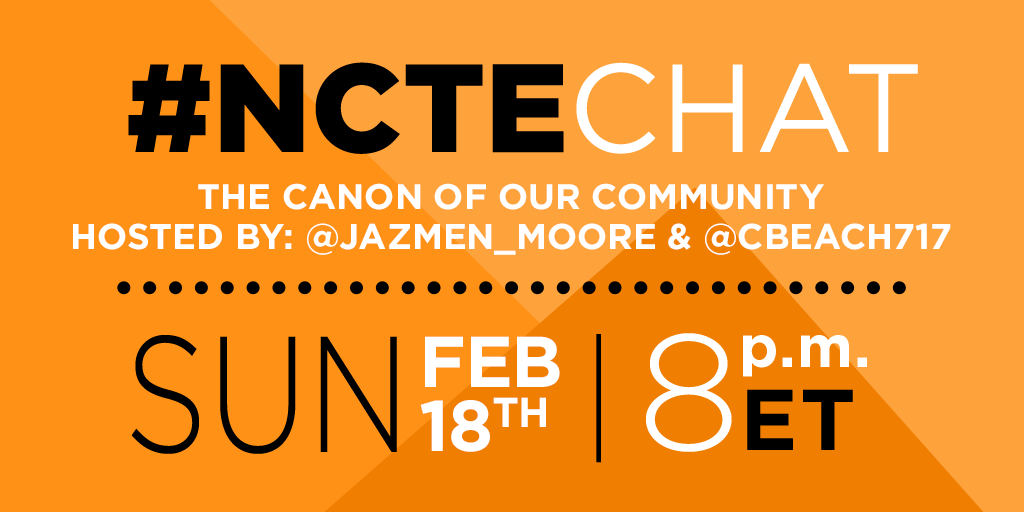Jazmen Moore (@jazmen_moore), Chicago, IL
Crystal Beach (@cbeach717), Metro-Atlanta, Georgia
Committee Against Racism and Bias in the Teaching of English
February 18, 2018—8 p.m. EST
NCTE’s Committee Against Racism and Bias in the Teaching of English will host #NCTEchat on Sunday, February 18th, focusing on the topic, “The Canon of Our Community.” When called to reimagine the traditional English canon, it is of utmost importance that we, as literacy educators, consider the stories of our students and the communities we teach in and the roles these stories play in our classrooms. By positioning the stories of our students and school communities as crucial components of the learning taking place in our classrooms, we are better able to celebrate the voices of our students and honor the literacies of their communities.
As our Committee continues to find ways to support teachers in a time in which there is no apolitical classroom, we feel that our communities continue to provide language and literacy learning opportunities for our students. In fact, one of the statements we make in our anti-racism posters is that “anti-racist curricula provide students with opportunities to cite, explore, and welcome marginalized voices of color in their communities.” Additionally, we challenge teachers to “provide students with lessons that empower students and honor their multiple Englishes as well as their home and cultural spaces.”
As we begin gearing up for the 2018 NCTE Annual Convention and its theme, “Raising Student Voice,” we hope to explore the silences that exist in our curriculum and instruction where our students’ voices may be missing. This month’s #NCTEchat will serve as an opportunity for English language arts educators to share methods used to hold space for students to speak their truths in our classrooms and to consider how we can partner with artists and organizers in our communities who are also engaged in the work of amplifying student voice.
Jazmen Moore (@jazmen_moore) and Crystal Beach (@cbeach717) will be leading the chat but we’re honored to welcome two guests, leading community experts whose work supports and builds the canon of their communities.
The son of Mexican immigrants, José Guadalupe Olivarez (@_joseolivarez) is the Marketing Manager at Young Chicago Authors and teaches/writes curriculum for the organization dedicated to helping young people to “pursue the path they choose and work to make their communities more just and equitable” through their own stories and the stories of others. His first book, Citizen Illegal, is forthcoming from Haymarket Books.
Born and raised in Atlanta, Georgia, Paul Ayo (@aacpaulayo) created Arts as an Agent for Change in 2006 to focus on “the power of STREAM (Science, Technology, Reading, Engineering, Art, and Mathematics)” in order to develop its mission to support “artistic collaboration, community engagement, arts activism, and improving education through the power of ART.”
The following questions will be shared during our Twitter chat, following introductions:
Q1. How would you define the canon of your community? What voices are present? Which ones are missing?
Q2. In what ways have you used art forms beyond traditional texts to hold space for students to celebrate their stories/experiences and the linguistic diversity of their communities?
Q3. During #BlackHistoryMonth, we celebrate the African American Read-In, which aims to bring Black authors into the canon of our communities. How can you engage students in writing by Black authors in ways that honor the Black community’s voice and resistance? #AARI18 #NCTEchat
Q4. How can educators consider the recent Black Lives Matter at School Week when thinking about students, their communities, and their canons?
Q5. What are some resources, poets, poems, and/or pairings you would recommend to help engage students in literature that is written in and/or about their communities?
Q6. What is one thing you learned tonight that you look forward to taking back to your classroom?
We hope to see you on Twitter!

